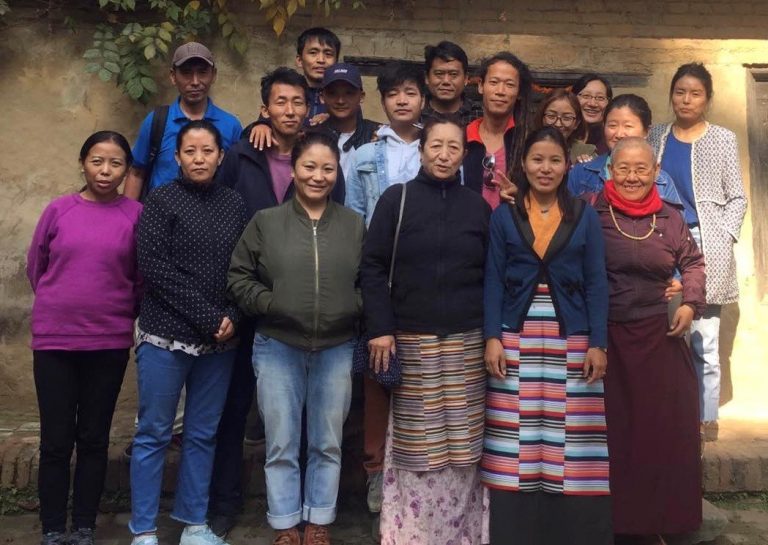Virtual language course augments Nepal students’ immersive experience
January 10th, 2023 | SIT Study Abroad
Learn more about SIT Nepal: Tibetan and Himalayan Peoples
Two students on the fall 2022 SIT program Nepal: Tibetan and Himalayan Peoples got a jump start on their language learning even before their immersive program began.
Lily Talmont, a senior at Macalester College, and Sonam Rikha, a junior at Pomona College student, both took SIT’s virtual Tibetan language summer course as a precursor to their study abroad experiences.
“SIT's program in Nepal stood out to me because of the authentic connection with the Tibetan community that was evident in the program listing,” said Lily. “This has been a huge highlight and strength of this program. A part of this connection with the Tibetan community is the program's commitment to teaching the Tibetan language.”

She said she was pleasantly surprised to find that SIT offered a virtual Tibetan language program. “Immediately, I was attracted to the idea of continuing with the same teachers through the summer and fall. I had no idea just how impactful this decision would be.”
Lily said the connections she formed online with her language teachers and partners eased her anxiety about traveling to Nepal. “When I arrived in Pharping, my favorite language partner, Ani Sangye la, made me a bracelet that I wear every day. I felt so welcomed and happy to be with the people I had developed friendships with over the summer.”
Sonam, an international studies major with a minor in Asian studies, is the daughter of Tibetan refugees. She grew up in a small Tibetan community in Chicago and hopes to incorporate her culture and her career.
“As an international relations major, I was interested in the politics of Tibet and the Himalayas, which is a region that is overlooked and understudied,” she said. “I was particularly interested in the experiences of Tibetan refugees in Nepal and India. The SIT Nepal: Tibetan and Himalayan Peoples program seemed perfect for my academic interests and my desire to develop my proficiency in Tibetan. Also, the excursions the program takes to different parts of the Himalayas 100 percent sparked my interest and excitement to participate in the program.”
Before her virtual class in summer 2021, Sonam says her language proficiency was “beginning intermediate and conversational” so she enrolled in the Intermediate Tibetan II course online to improve her language skills before traveling to Nepal. The course made it easier for her to understand Tibetan grammar rules.

“I appreciated that the class sizes were small and really loved having one-on-one conversations with different Tibetan language partners,” she said. The program’s language partners are from various backgrounds and different regions of Tibet. Sonam said not only did her conversations with them help to improve her language ability, it also helped her learn more about the status of Tibetan refugees in Nepal.
Sonam said she still felt uncertain about speaking Tibetan when she arrived in country. “I was conversational and knew I could survive with my language skills, but my speaking level wasn’t always grammatically correct, and my vocabulary was limited.”
She said her new language skills were most helpful with her homestay family, who didn’t speak English, and on an excursion to Helambu, which is home to the Yolmo people. “The Yolmo people have cultural and linguistic ties to Tibet. The Yolmo language is very similar to Tibetan. Therefore, I was able to converse and bond with my Yolmo host dad and host mom, who only knew Nepali, Yolmo, and a bit of Tibetan.”
Lily said her new language skills were not only helpful in country, but also inspirational. “In terms of language improvement, I cannot understate how much I have surprised myself. I have had several conversations in Tibetan without much help. Albeit basic conversations, those conversations have really inspired me to continue learning more languages.”
Both women concluded their programs in December with independent projects. Lily taught English Tibetan, and math to kindergarteners, while Sonam researched Tibetan statelessness in India.
Sonam says she will continue practicing Tibetan with her family and community members. Her career goal, she says, it to work for the United Nations Human Rights Council or the United Nations Refugee Agency and “uplift the voices of stateless Tibetans as well as Tibetans inside Tibet.”
